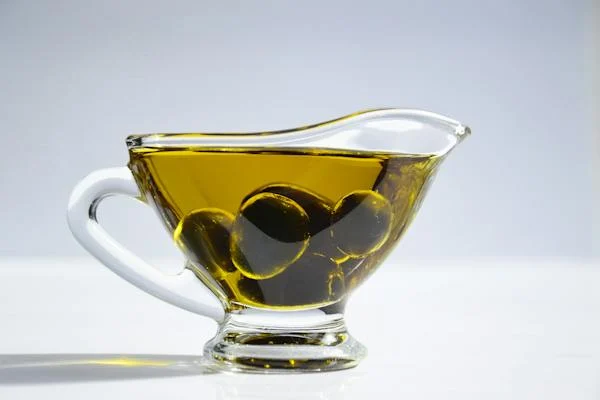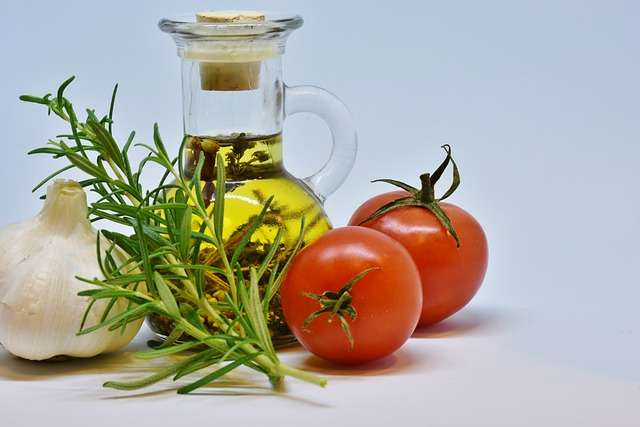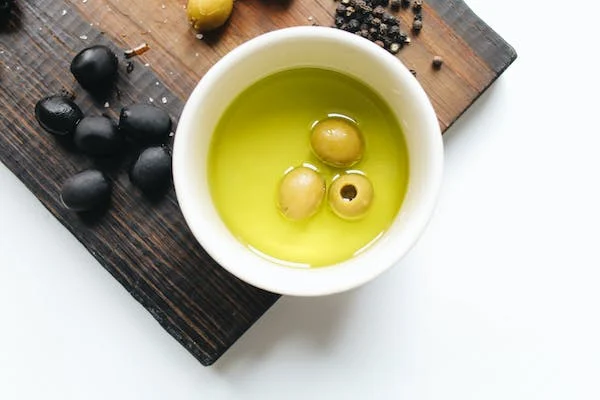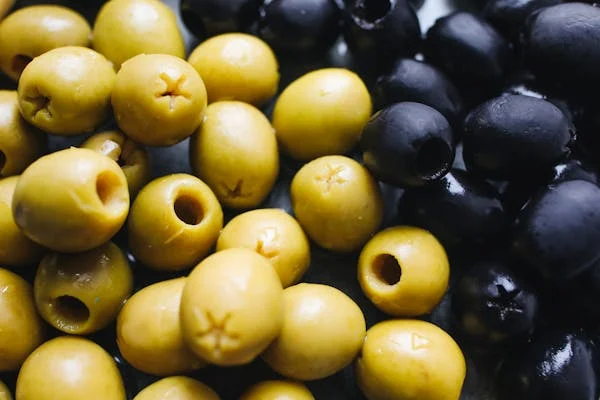Introduction:
An example of a vegetable oil is olive oil, which is made from the fruit of the olive tree (Olea europaea). It is rated highly for its flavor, adaptability, and potential health advantages, and nutrition facts of olive oil.

There are numerous types of olive oil, each with unique qualities, processing techniques, and attributes. The most common varieties of olive oil are:
Olive oil extra virgin (EVOO)
• Produced by mechanical pressing of olives without the addition of heat or chemicals, extra virgin olive oil is thought to be the highest quality and purest type of olive oil.
• Has a low acidity level (usually less than 0.8%) and a rich, fruity flavor.
• The largest concentration of natural antioxidants and nutrients are retained, making it perfect for salad dressings, drizzling over baked goods, and dipping bread in.

Virgin Olive Oil
• Mechanically pressing olives without the use of heat or chemicals results in the production of virgin olive oil.
• Acidity level is slightly greater (often up to 2%), suggesting a slightly inferior quality than extra virgin olive oil.
• Can be used for roasting and cooking; however, it may not have the depth and intensity of EVOO.
Olive Oil
• A product made from a mixture of virgin or extra virgin olive oil and refined olive oil, refined olive oil has undergone processing to eliminate impurities and defects using heat and chemicals.
• Due to its high smoke content, it is frequently used for high-heat cooking, such as frying, and has a milder flavor and lighter color than virgin olive oil.
Nutritional Composition of Olive Oil:
Including nutrition facts about olive oil and calories and serving size, fat (monounsaturated, polyunsaturated, and saturated), vitamins (Vitamin E), and antioxidants (polyphenols), below is a breakdown of the nutrients in olive oil:
Serving size and caloric content
• Calories: Each tablespoon (15 ml) of olive oil contains roughly 120 calories. This indicates that it offers a significant amount of energy for your diet.
• Serving Size: The most popular serving size for olive oil is one tablespoon. Serving quantities are often expressed in tablespoons or milliliters and described in the nutrition facts of olive oil.
Fat
• Monounsaturated fats: particularly oleic acid, make up the majority of the fat in olive oil. Monounsaturated fats are thought to be good for the heart and may help lower the chance of developing heart disease. They account for a sizeable amount of the total fat in olive oil.

• Polyunsaturated fats: Omega-3 and omega-6 fatty acids are two examples of the minor levels of polyunsaturated fats in olive oil, which are present despite the fact that monounsaturated fats make up the majority of the oil. These fats serve a variety of functions in the maintenance of health and are necessary for the organism.
• Saturated fat: Low in saturated fat, which is regarded as less healthful when ingested in excess, is olive oil. Compared to many other cooking oils, olive oil has a lower saturated fat content.
Vitamin E
Alpha-tocopherol, a potent antioxidant found in vitamin E, is a rich source of the vitamin in olive oil. Free radicals can cause oxidative damage to cells, which vitamin E helps to prevent. It also supports the immune system and overall skin health.
Olive oil includes varying amounts of vitamin E, however, due to its reduced state; extra virgin olive oil often contains more of this nutrient than other forms of olive oil.
Polyphenols
Polyphenols are a class of natural antioxidants found in olive oil. These substances, such as hydroxytyrosol and oleuropein, have been linked to a number of health advantages.
Due to their anti-inflammatory qualities, polyphenols are thought to help prevent chronic diseases like heart disease and some types of cancer.
Phenolic content
Depending on the variety of olive, how it ripens, and the procedures used in processing, olive oil’s polyphenol concentration can change.

Due to very minimum processing, extra virgin olive oil typically has the greatest polyphenol content of all olive oil kinds.
Health Benefits of Olive Oil:
Olive oil is a common ingredient in many cuisines since it has numerous health advantages and nutrition facts of olive oil when consumed. The following are only a few of the significant health advantages of using olive oil:
1. Heart Health
• Monounsaturated fats: Oleic acid, in particular, makes up the majority of the monounsaturated fats in olive oil. These facts are well-known to benefit heart health. They can aid in reducing levels of LDL (low-density lipoprotein), sometimes known as “bad” cholesterol, which is a significant risk factor for heart disease.
• Reduce risk of cardiovascular diseases: A lower risk of cardiovascular disorders, such as coronary heart disease and stroke, is linked to regular consumption of olive oil. Olive oil contains monounsaturated fats that can help lower blood pressure, reduce inflammation, and enhance blood vessel function.
2. Weight Control
• Satiety: Eating with olive oil can make you feel satisfied and full afterward, which can help you curb your appetite and consume fewer calories overall. It may help with weight loss and weight management initiatives.
• Healthy fat source: Despite having a high-calorie count, olive oil is preferred above other cooking oils due to its monounsaturated fat content. It can be a healthy component of a balanced diet that aids with weight management when used in moderation.
3. Decreased Inflammatory Effects
• Polyphenols: Polyphenols are organic substances with anti-inflammatory qualities, and olive oil includes them. Heart disease, cancer, and autoimmune disorders are just a few of the diseases that are associated with chronic inflammation. Regular olive oil consumption can aid in lowering the risk of chronic inflammation and associated health issues.
4. Effects of antioxidants:
• Vitamin E: Alpha-tocopherol, which is found in olive oil, is a rich source of vitamin E. This vitamin functions as an antioxidant, assisting in defending cells and tissues against harm brought on by free radicals, and unstable chemicals that can result in a number of diseases and aging.
• Polyphenols: Olive oil contains polyphenols, which also function as antioxidants. They can lower oxidative stress, a crucial factor in many chronic diseases, and neutralize free radicals.
5. Other advantages include:
• Cancer prevention: Research suggests that olive oil’s polyphenols may protect against several cancers, particularly breast, colon, and prostate cancer.
• Improved mental health: Olive oil’s monounsaturated fatty acids and antioxidants may promote cognitive health and lower the risk of age-related cognitive decline.
How to use Olive Oil in your daily routine:
You may improve the flavor of your food while reaping the many health benefits an nutrition facts of olive oil by including it in your diet. Here are some doable ways to incorporate olive oil into your diet:
Homemade salad dressings
It should start with olive oil as a base. For a tasty and nutritious dressing, combine it with vinegar (such as balsamic or red wine vinegar), lemon juice, herbs, and spices.
Marinades
Combine olive oil with your favorite herbs, spices, garlic, and lemon juice to create marinades for meat, poultry, or shellfish. Before cooking, let your protein marinade for a few hours or overnight.
Frying and Stirring
Olive oil, especially extra virgin olive oil, has a relatively high smoke point, making it perfect for frying and stirring. Use it to cook fish, lean meats, or vegetables.
Grilling
When grilling, brush lean meats, tofu, or veggies with olive oil. It imparts flavor and aids in preventing stickiness.
Roasting
Before putting meat, poultry, or vegetables in the oven to roast, sprinkle them with olive oil. Oil aids in creating a crispy texture and improves flavor.
Smoothies
To give your morning smoothie a nutritional boost, think about adding a teaspoon of extra virgin olive oil. While adding healthy fats and antioxidants, it won’t greatly alter the flavor.
FAQs:
1. Does olive oil benefit my heart health?
Due to its high content of monounsaturated fats, olive oil, particularly extra virgin olive oil, can support heart health.
2. How ought olive oil to be kept?
To maintain its freshness, store olive oil in a cool, dark location away from heat and light.
3. Can extra virgin olive oil be used for cooking at high temperatures?
Cooking over low to medium heat is best done with extra virgin olive oil. Use olive oil with more smoke while cooking at a high temperature.
4. In olive oil, what distinguishes green from black olives?
Olive oil’s color is unaffected by olives. Both can be utilized to produce various kinds of olive oil.
5. does using olive oil aid in weight loss?
Due to its stimulating qualities and good fats, olive oil can assist with weight management when used in moderation.
Conclusion:
In summary, olive oil is a nutrient-dense food with a long history and a variety of health advantages. It is a great supplement to any diet due to its high monounsaturated fat, antioxidant, and nutrient content.
Olive oil not only improves food flavor but also encourages heart health and weight loss whether it is drizzled on salads, used in cooking, or eaten as a dip. Provides antioxidant protection and aids in the fight against inflammation.
Extra virgin olive oil offers the greatest nutritional value, therefore choose extra virgin olive oil when making your purchase. Also, remember to use olive oil sparingly as part of a balanced diet to maintain good health.
